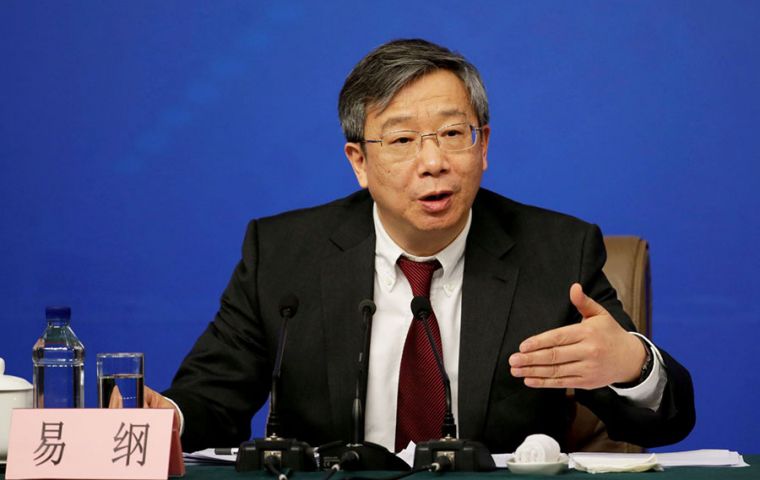MercoPress. South Atlantic News Agency
Yuan at appropriate level says China, furious with IMF over quotas adjustments
 Yi said that there was “growing market acceptance for two-way exchange rate fluctuations” in the Yuan, also known as the renminbi or RMB.
Yi said that there was “growing market acceptance for two-way exchange rate fluctuations” in the Yuan, also known as the renminbi or RMB. China's top central banker said on Saturday that potential escalation of trade tensions and policy uncertainty were the major risk factors facing the world economy, and market forces were keeping China's Yuan at an appropriate level.
Yi Gang, the governor of the People's Bank of China, said in a statement to the International Monetary Fund's steering committee that Beijing is “deeply disappointed” in the IMF's failure to realign its shareholding structure to recognize the rising influence of China and other fast-growing economies.
Yi pushed back against the U.S. Treasury's Aug 5 designation of China as a currency manipulator after China's Yuan fell below the psychologically important level of 7 to the dollar. His statement said that the depreciation in the Yuan since the beginning of August has been driven by market forces, including volatility prompted by escalating trade tensions.
Yi added that there was “growing market acceptance for two-way exchange rate fluctuations” in the Yuan, also known as the renminbi or RMB.
“Judging both from economic fundamentals and from market supply and demand, the RMB exchange rate is at an appropriate level,” Yi said.
In a dig at the Trump administration's “America First” trade stance, Yi said: “the wave of populism and protectionism in some countries has undermined mutual trust, reducing their willingness to cooperate on a multilateral basis.”
Yi's statement did not mention the “Phase 1” trade deal that U.S. President Donald Trump announced on Oct 11, but warned of the problems that trade tensions have caused for the global economy.
“Signs of disruptions have emerged in global trade and in global industry chains, supply chains, and value chains,” he said. “Trade tensions have dampened market confidence, which may amplify financial market volatility and drag down economic growth.”
On IMF quotas, Yi said that IMF members needed to honor previous commitments to adjust the IMF's shareholding to reflect the growing power of dynamic emerging market economies and said that China supported an adequately resourced IMF based on quota resources, not temporary lending arrangements.
The IMF on Friday announced that members had agreed to keep IMF lending resources at US$1 trillion, through extension and a doubling of its crisis lending fund and a corresponding reduction in bilateral borrowing arrangements.
But in a move that preserves U.S. veto power over major Fund decisions for four more years, IMF members delayed the next quota review until December 2023.




Top Comments
Disclaimer & comment rulesCommenting for this story is now closed.
If you have a Facebook account, become a fan and comment on our Facebook Page!